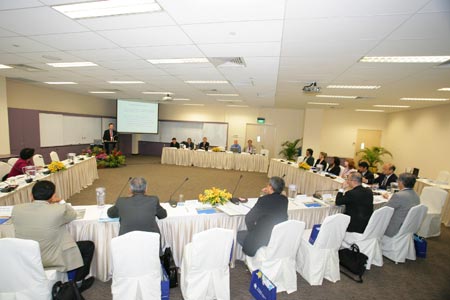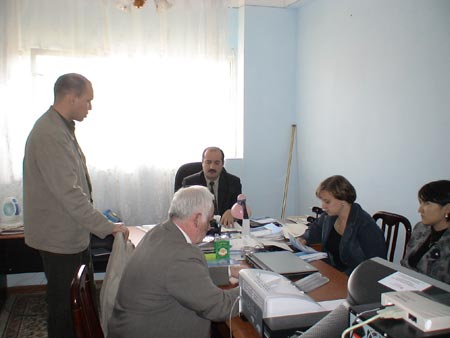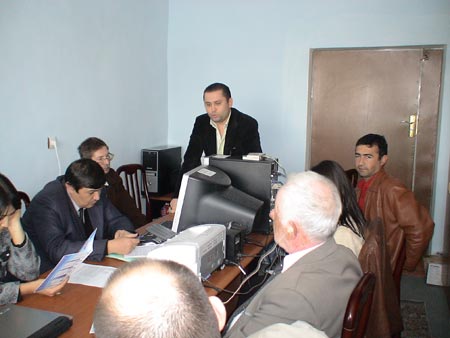REGIONAL CONSULTATION MEETING ON DEVELOPING KNOWLEDGE AND LESSONS
The Regional Consultation Meeting for Candidate Water Knowledge Hubs in the Asia-Pacific Region was hosted by Singapore’s Public Utilities Board (PUB Singapore) on 29-31 October 2007 at the Singapore WaterHub. The meeting was organized in the context of the Asia Pacific Water Forum’s (APWF) Key Result Area 1 activities for developing knowledge and lessons. The meeting was attended by 24 representatives from 14 leading research and information centers from Indonesia, China, Malaysia, Australia, Sri-Lanka, Japan, Central Asia, Korea, etc.

The first day was opened by Mr. Ng Han Tong, Industry Development Department at PUB Singapore and the representatives of UNESCO-IHE Mr. Jan Luijendijk and ADB Mr. Wouter Arriens, who moderated the meeting. The moderators made introduction presentations about possibilities of and approaches to water knowledge sharing in the Asia-Pacific region. Mr. Tan Ban Thong, manager of Singapore WaterHub, explained how to establish knowledge hubs using the Singapore WaterHub as an example. Then, other Candidate Water Knowledge Hubs made their short presentation. Oygul Usmanova, head of international relations division at SIC ICWC (Scientific-Information Center of the Interstate Commission for Water Coordination), represented this Center at the meeting and made presentation, where she described activities of SIC, its main fields of expertise and presented a CAREWIB Project as a basis for the establishment of WaterHub in Central Asia, as well as proposals for cooperation with other similar water knowledge hubs in the Asia-Pacific region regarding both information exchange and joint training programs.
The next day was dedication to discussion of a model and key operating principles of WaterHub. A need was underlined for a new approach for knowledge partnerships and networking in the Asia-Pacific region with the help of regional water knowledge hubs that focus on key water sector topics (knowledge domains). In this approach, space is created for countries with advanced expertise and existing centers of excellence in the region to offer their services as a regional water knowledge hub to clients and partners in the region.
For the new approach to work and become self-sustaining, the regional water knowledge hubs will need to demonstrate and maintain excellence in their products and services to meet client needs. Adopting a number of common key operating principles will help to ensure that this happens. Each regional water knowledge hub should be able to demonstrate: vision and leadership; a focus on client needs; significant outcomes and impact in the region; a team of experienced specialists; generation and identification of state-of-the art knowledge; a stimulating research environment including internships for younger researchers; relevant and feasible knowledge solutions to address water management challenges in the region; regular comparative analysis across the region; excellent products and services that meet client needs; an inclusive attitude to knowledge networking; dissemination of up-to-date information for the region; an entrepreneurial approach to developing a sustainable business model; and adequate human and financial resources to develop the knowledge hub’s excellence.
The key water sector topics were identified and comprised water management, including separately Central Asia and Pacific countries, water governance, urban water supply, etc. After the discussion, the participants visited major infrastructure objects of PUB Singapore, namely treatment structures and Marine Barrage construction through Marina channel, which would prevent coastal areas from flooding and simultaneously create a fresh-water reservoir with constant water level.
Finally, cooperation among the candidate regional water knowledge hubs was discussed and the participants shared their visions about roles of their institutions as water hubs. Then a Message from the Regional Consultation Meeting containing key findings and recommendations was approved. Particularly, it is planned to make announcement of candidate hubs and the proposed Network at the 1st Asia Pacific Water Summit on 3-4 December in Beppu, Japan. Besides, each candidate hub should complete the development plan in the first quarter of 2008 and based on a review of the development plan, regional water knowledge hubs for priority water sector topics (knowledge domains) are to be recognized.
TRAINING SEMINAR ON FORMATION OF A NATIONAL INFORMATION SYSTEM
IN THE REPUBLIC OF TAJIKISTAN UNDER THE CAREWIB PROJECT
A training seminar on formation of a national information system in the Republic of Tajikistan was organized and held from 25 to 28 October 2007 in Dushanbe by the CAREWIB Project staff.
According to the Memorandum signed between the Ministry of Land Reclamation and Water Resources (MLRWR) of Tajikistan and SIC ICWC, the CAREWIB Project staff purchased and delivered computer equipment to MLRWR of Tajikistan, including: server for storage of national database; computer for data input and handling; printer; network equipment (hub, cable, modem); uninterruptible power supply unit. The equipment was installed in the national focal point established at MLRWR of Tajikistan, and work on connecting three computers to the network was done.
Specialists from MLRWR Tajikistan, SIC ICWC Tajik office, TajikNIIGiM, ADB Project “Agricultural Rehabilitation in Tajikistan” passed training.
Project Manager I.F. Beglov told about the project goals and objectives, achievements of Phase 1, expected results of Phase 2, and answered asked questions. The major direction of the CAREWIB Project in Phase 2 will be to help national water management organizations to create national databases. Therefore, it is planned to purchase, deliver, install and adjust modern computer equipment using project funds. In addition, it is planned to organize initial training of persons responsible for creation of national databases and further advise them through the forum on the CAWater-Info portal and via e-mail. Thereupon, the seminar in Dushanbe is first in the series of training seminars to be held this year by the project staff in the five Central Asian countries. It is also foreseen to hold such training seminars twice a year and one regional conference, at which it is planned to listen to yearly progress reports made by leaders of the national focal points.

IS Block Coordinator D.A. Sorokin told about general principles for creation of databases, architecture, project decisions, familiarized the participants with methodical materials prepared for the seminar, and answered put questions. In addition, he presented the participants a template of national database prepared by the project staff for MLRWR of Tajikistan.

At request of the specialists undergoing the training, during practical exercises a database was created according to the 2TP-vodkhoz Form of MLRWR Tajikistan: tables, queries, data and diagram visualization forms, reports were made up.
In conclusion, all the participants of the seminar expressed their sincere gratitude to the seminar organizers – SIC ICWC and seminar sponsor SDC.
|